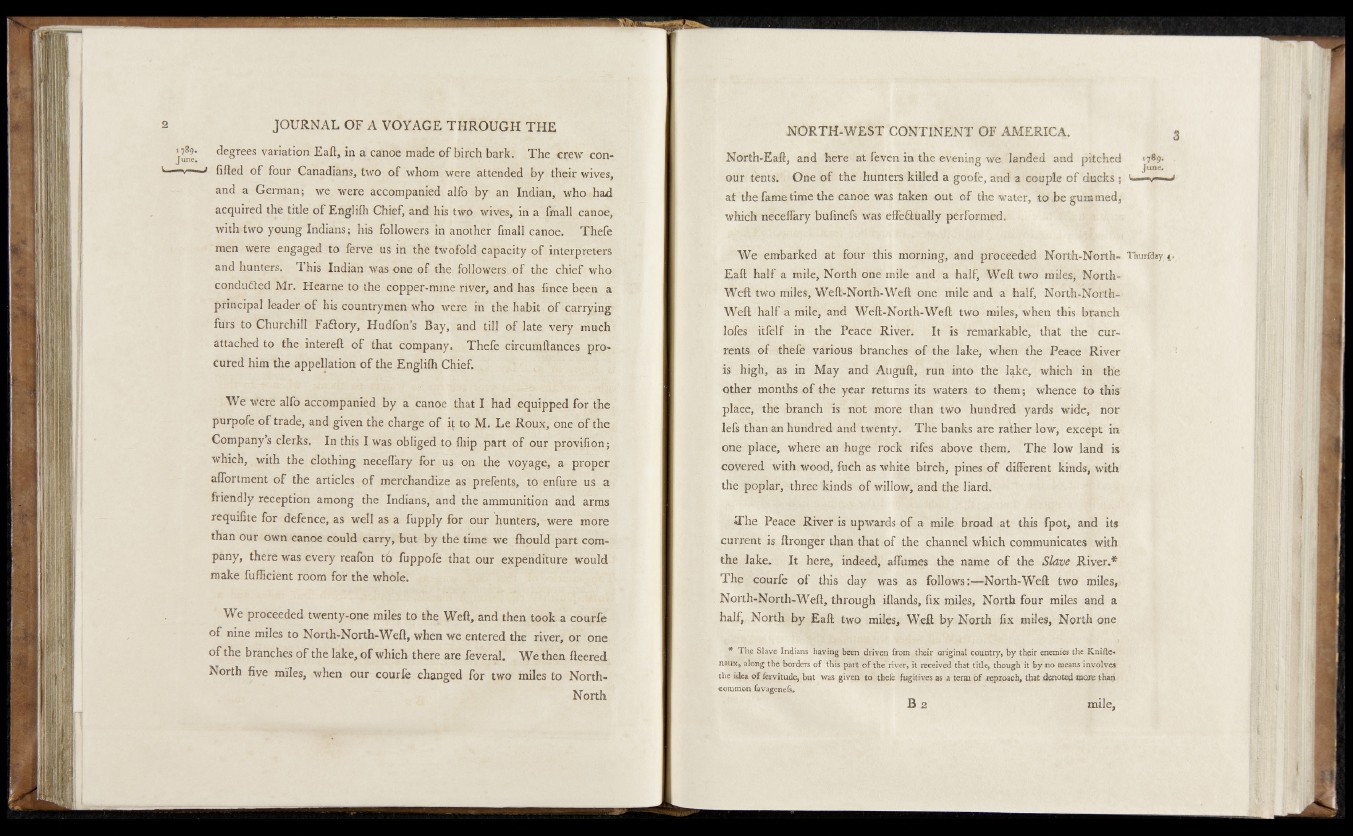
degrees variation Eaft, in a canoe made of birch bark. The -c^eyr con-
fifted o f four Canadians, two o f whom were attended by their wives,
and a German* we. were accompanied affo by an Indian, whojhad
acquired the title of Englifh Chief, and his two wi\*es, in a final! canoe,
wittówo yamn^ïfidij&s; his followers in another fmall canoe!' Thefe
men Were engaged to ferve us in thé twofold, capacity of interpreters
and hunters. This Indian was one ©f the followers of the chief who
copdudted Mr. Hearne to the copper-mine river, and has fince been a
principal leader o f his countrymen who were in the habit o f carrying
ftfrs tö Chüïchiïf FaSory, Hudlbh’s Bay, and till of^ate^vefy^mnch
attached to the intereft of that company.,;, Thefe circumftances procured
him the appellation of the Englilh Chief. .
We v^Cre alfó accompanied by a canoe that I had equipped for the
purpofe o f trade, and given the charge of i| to M. Le Roux, one o f the
Company’s clerks. In this I was obliged to fhip part of ou,r prövifion ; >
which, with the clothing neceffary for. us on, the voyage, a proper
aflbrtment o f the articles o f merchandize as.prefents, to eniurq us a
friendly reception among the Indians, and the ammunition and arms
requinte for defence, as well as a fupply for our hunters, were more
than our Own canoe could carry, but by the time we fhould part com-
pany, there was every reafcm t6 fuppofe that our expenditure would
make fufficient room for the whole.
We proceeded twenty-one miles to the Weft, and then took a eottrfe
of nine miles to North-North-Weft, when we entered the river# or one
of the branches of the lake, o f which there are feveral. We then fleered
North five miles, when our courfe changed for two miles to North-
North
North-Eaft, and here at feven in the evening we. landed and pitched >
1 Ü J : .. 1 June.
our tents**- One of the hunters killed a goofe, and a couple o f docks ;
at the fame time the canoe was taken out o f the water, to he gummed,
which necéflàry bufihds was effectually performed.
We embarked at four this morning, and proceeded North-North- Thurfday 4,
Eaft half a mile, North one mile and a half, Weft two miles, North-
Weft two miles, Weft-North-Weft one mile and a half, North-North-'
Weft half^a mile, and Weft-North-Weft two miles, when this branch
lôfiéik’itfêlï in the Peace Riven- It- is remarkable, that thev currents
of thefe various branches of the lake, when the Peace River
is high, hs in May and Auguft, run into the lake, which in the
other months Of the year returns its waters to them? whence to this'
place, the branch is not More than two hundred* yards wide, nor
lefs than an hundred and twenty. The banks are rather low, except in-
ohé place, where an huge‘rock rifes above them. The low land is
covered with wood, fuch as white birch, pines of different kinds, with
the poplar, three kinds of willow, and the hard.
«The Peace River is upwards of a mile broad at this fpot, and its
cuntsent is ftrongèr than that of the channel which communicates . with
the lake, It here, indeed, affumes the name of the Slave River.*
The courie o f this day was as fbllotMt-sr^orth-Weft two miles.,;
North-North-Weft, through jfiands, fix miles, North four miles and a
half, North by Eaft two miles, Weft fry North fix miles, North one
f Sl^ve Indians having been driven from their original cowtry, by their enemies the Knifte*
naux, aiong thé borders of tons plot of the riVer, it received that title, though 'it fry no means involve*
thgfidea of fervitude, hpt was given' $0; -thefe fugitives as « term pf .«epjpaeh, that demoted more than
common favagenefi.
B 2 mile,